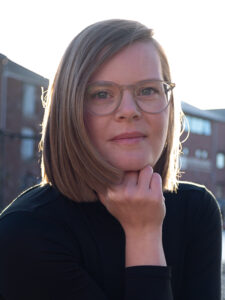 We’re delighted to welcome Dr Ina Linge to Edinburgh as EEHN-IASH Visiting Fellow for May and June 2025.
We’re delighted to welcome Dr Ina Linge to Edinburgh as EEHN-IASH Visiting Fellow for May and June 2025.
Ina is Senior Lecturer in German in the Department of Languages, Cultures and Visual Studies at the University of Exeter, where she is co-director of the Sexual Knowledge Unit, steering group member of the Heritage@Exeter network, and affiliate member of the Centre for Environmental Arts and Humanities, and the Centre for Medical History.
At Edinburgh, Ina will be working on her AHRC Catalyst-funded project ‘Queer Natures: Animals, Environment and Modern Sexual Knowledge Production (1860s to 1930s and today)’. This project investigates how German-language artists, scientists and writers (1860s-1930s) mobilised knowledge about non-human animals and their natural environment to create new ideas about the place of LGBTQ+ people in a fair society.
Ina will be giving two talks during her stay, which you are welcome to attend. Details are below.
Sexual Knowledge Production beyond the Human: Gender, Animality and Vitality in Mysterium des Geschlechtes (Mystery of Sex, 1933)
Monday 12th May, 4.30pm in the Project Room (1.04), 50 George Square. Followed by a wine reception.
My AHRC-funded research project “Queer Natures” (2024-26) investigates how German-language artists, scientists and writers (1860s-1930s) mobilised knowledge about non-human animals and their environment to create a new understanding of gender, sexuality, and queerness. My talk will introduce one example from this archive, the Austrian sexual enlightenment and medical film Mysterium des Geschlechtes (Mystery of Sex, 1933). Using the lenses of queer ecology, trans studies and animal studies, I will trace the use of human and non-human experimental bodies in the film. The film depicts non-human animals that are used in lab experiments to study physiology and reproduction, in particular rodents and farmed animals such as pigs and cattle. Unlike companion species like cats and dogs, such “non-charismatic” animals are either considered to be pests or food, and featured heavily in experimental lab cultures, where they were put in the service of improving human health and vitality. I outline how the film similarly displays human experimental objects, specifically trans* bodies, to extract knowledge that enhances binary expressions of gender. Consequently, I show that the film uses trans and non-human bodies to present a gendered understanding of health and vitality that serves to supercharge cis-masculinity. In doing so, however, the film makes visible the constructedness of gender, animality and vitality, and offers us a way to resist this regressive and persistent logic.
Ants in Your Pants: Queerness, Nature and Nationalism in Hanns Heinz Ewers’ Ameisen [The Ant People] (1925)
Seminar Room, Institute for Advanced Studies in the Humanities. 4 June, 1pm.
My AHRC-funded research project “Queer Natures” (2024-26) investigates how German-language artists, scientists and writers (1860s-1930s) mobilised knowledge about non-human animals and their environment to create new ideas about the place of LGBTQ+ people in society. In this paper, I present research from one of my chapters. Hanns Heinz Ewers’ Ameisen [The Ant People] (1925), marketed as nature writing, interweaves scientific explanations of the lives of ants with “myrmecomorphic” (ant-like) short stories, where humans increasingly become antlike in their (a)moral and erotic behaviour. In the 1920s, ants as eusocial animals that form complex colonies were often considered to hold up a mirror to human society. I argue that in Ameisen, the social and productive behaviour of ants is presented as parallel to that of queer humans, and both are made to play a pivotal role in developing an understanding of nationalism across species boundaries. Whereas reproductive roles and capabilities were often used to tie gender to specific social and political roles, queer people were often relegated to the realm of the non-reproductive and were thus understood to be antithetical to the nationalist project. Ameisen, however, draws on sexological knowledge to engage liberal, rights-based concerns for gender and sexual diversity and to activate a logic of productivity and usefulness as building blocks towards a nationalist model for the ethno-German nation state. This begs the question: What can ants really teach us about human society? And can we maybe give the ants a rest?
(hybridnighthawk on unsplash)
(hybridnighthawk on unsplash)



